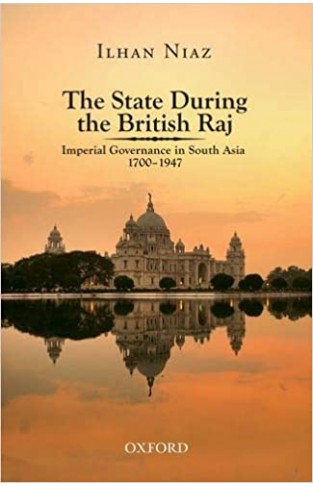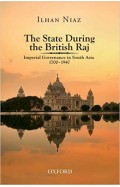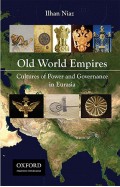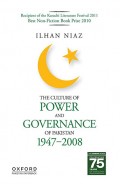The State During the British Raj: Imperial Governance in South Asia 1700-1947 - Hardcover
By: Ilhan Niaz
-
Rs 1,395.00
- Rs 1,550.00
- 10%
You save Rs 155.00.
Due to constant currency fluctuation, prices are subject to change with or without notice.
This book explores institutional development in British India which encompassed both the modernization of existing practices and arrangements (such as the bureaucracy and the military) and the importation of alien practices (such as the rule of law, representation, and mass politics). During the nearly two centuries of British political and military domination of South Asia, the institutional basis for Indias and Pakistans colonial democracies was laid. For varied reasons, South Asian elites have been reluctant to engage with the history of British India as a state that was very much the successor of the Timurid (Mughal) Empire and the precursor to the republics of contemporary South Asia. This study argues in favour of re-engagement with the processes of institutional development in South Asia and the manner in which the arbitrarily run estates of the pre-British Indian periods were gradually converted into form, and to a limited extent, imbued with the substance, of a modern constitutional state as a direct result of British rule. Given that the crisis of governance in South Asia arises in part from the inability of Indian and Pakistani elites to operate the institutional frameworks bequeathed to them and reform them further, it is hoped that this study will provide historical context to discussions about crises of governance in South Asia.
This book explores institutional development in British India which encompassed both the modernization of existing practices and arrangements (such as the bureaucracy and the military) and the importation of alien practices (such as the rule of law, representation, and mass politics). During the nearly two centuries of British political and military domination of South Asia, the institutional basis for Indias and Pakistans colonial democracies was laid. For varied reasons, South Asian elites have been reluctant to engage with the history of British India as a state that was very much the successor of the Timurid (Mughal) Empire and the precursor to the republics of contemporary South Asia. This study argues in favour of re-engagement with the processes of institutional development in South Asia and the manner in which the arbitrarily run estates of the pre-British Indian periods were gradually converted into form, and to a limited extent, imbued with the substance, of a modern constitutional state as a direct result of British rule. Given that the crisis of governance in South Asia arises in part from the inability of Indian and Pakistani elites to operate the institutional frameworks bequeathed to them and reform them further, it is hoped that this study will provide historical context to discussions about crises of governance in South Asia.
The State During the British Raj: Imperial Governance in South Asia 1700-1947 - Hardcover
By: Ilhan Niaz
Rs 1,395.00 Rs 1,550.00 Ex Tax :Rs 1,395.00
Old World Empires Cultures of Power and Governance in Eurasia
By: Ilhan Niaz
Rs 1,444.50 Rs 1,605.00 Ex Tax :Rs 1,444.50
The Culture of Power and Governance of Pakistan 1947-2008
By: Ilhan Niaz
Rs 877.50 Rs 975.00 Ex Tax :Rs 877.50
Zubin Mehta: A Musical Journey (An Authorized Biography)
By: VOID - Bakhtiar K. Dadabhoy
Rs 630.00 Rs 1,050.00 Ex Tax :Rs 630.00
How to Stay Sane in an Age of Division: The powerful, pocket-sized manifesto
By: Elif Shafak
Rs 1,885.50 Rs 2,095.00 Ex Tax :Rs 1,885.50
The Origins of Political Order From Prehuman Times to the French RevolutioN
By: Francis Fukuyama
Rs 3,505.50 Rs 3,895.00 Ex Tax :Rs 3,505.50
Manning Up: How the Rise of Women Has Turned Men into Boys
By: Kay Hymowitz
Rs 796.00 Rs 995.00 Ex Tax :Rs 796.00
The Obama Syndrome: Surrender At Home War Abroad
By: Tariq Ali
Rs 1,165.50 Rs 1,295.00 Ex Tax :Rs 1,165.50
The Quest For Meaning: Developing A Philosophy Of Pluralism
By: Tariq Ramadan
Rs 1,255.50 Rs 1,395.00 Ex Tax :Rs 1,255.50
The Pakistan US Conundrum Jihadists The Military And The People The Struggle For Control
By: Yunas Samad
Rs 1,255.50 Rs 1,395.00 Ex Tax :Rs 1,255.50
An Enemy We Created: The Myth Of The Taliban Al Qaeda Merger In Afghanistan 19702010
By: Alex Strick van Linschoten
Rs 4,200.00 Rs 5,250.00 Ex Tax :Rs 4,200.00
WikiLeaks: Inside Julian Assanges War on Secrecy
By: David Leigh & Luke Harding
Rs 680.00 Rs 850.00 Ex Tax :Rs 680.00
How to Stay Sane in an Age of Division: The powerful, pocket-sized manifesto
By: Elif Shafak
Rs 1,885.50 Rs 2,095.00 Ex Tax :Rs 1,885.50
No recently viewed books available at the moment.
Zubin Mehta: A Musical Journey (An Authorized Biography)
By: VOID - Bakhtiar K. Dadabhoy
Rs 630.00 Rs 1,050.00 Ex Tax :Rs 630.00
The State During the British Raj: Imperial Governance in South Asia 1700-1947 - Hardcover
By: Ilhan Niaz
Rs 1,395.00 Rs 1,550.00 Ex Tax :Rs 1,395.00
Old World Empires Cultures of Power and Governance in Eurasia
By: Ilhan Niaz
Rs 1,444.50 Rs 1,605.00 Ex Tax :Rs 1,444.50
The Culture of Power and Governance of Pakistan 1947-2008
By: Ilhan Niaz
Rs 877.50 Rs 975.00 Ex Tax :Rs 877.50
How to Stay Sane in an Age of Division: The powerful, pocket-sized manifesto
By: Elif Shafak
Rs 1,885.50 Rs 2,095.00 Ex Tax :Rs 1,885.50

















-120x187.jpg?q6)








-120x187.jpg?q6)



-120x187.jpg?q6)



